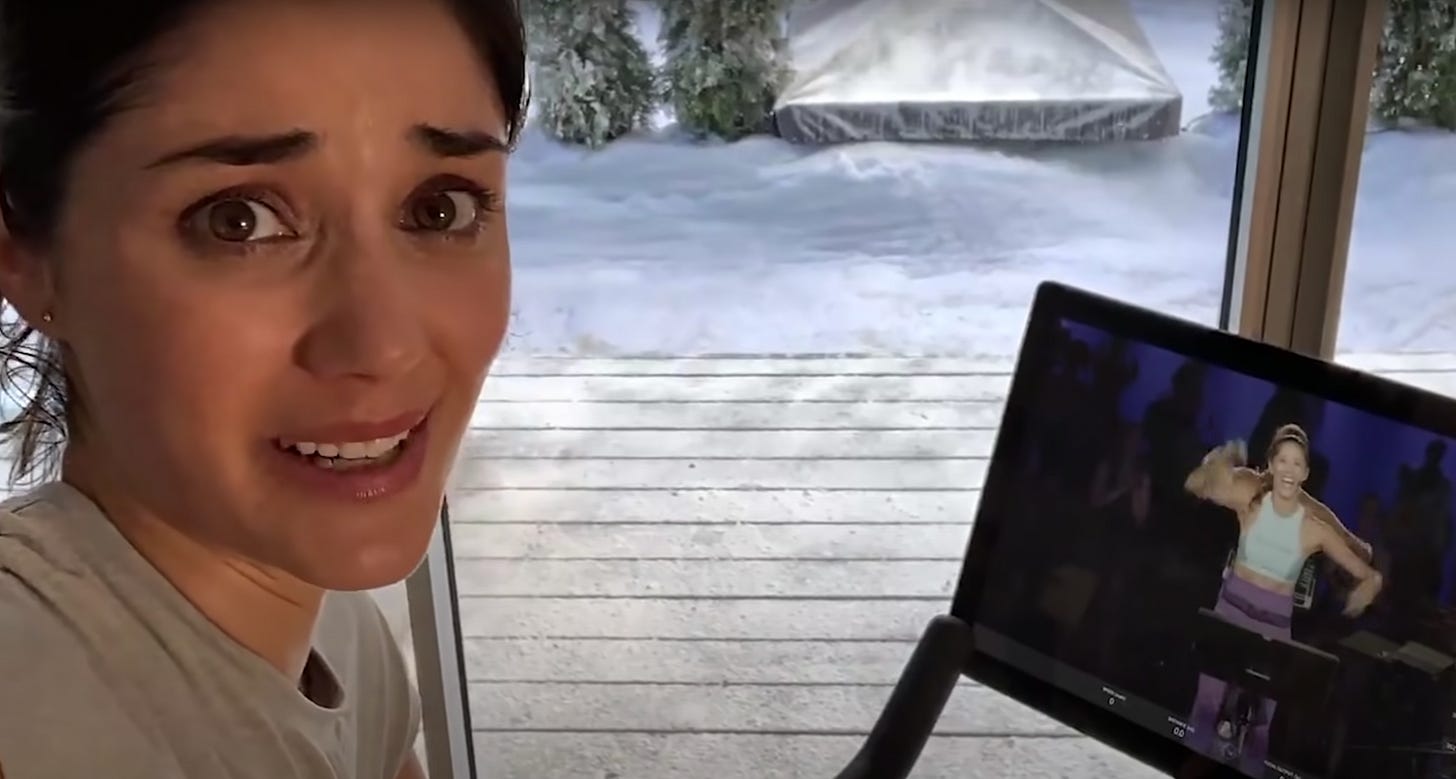Every week I highlight three newsletters that are worth your time.
If you find value in this project, do two things for me: (1) Hit the like button, and (2) Share this with someone.
Most of what we do in Bulwark+ is only for our members, but this email will always be open to everyone. To get it each week, sign up for free here. (Just choose the free option at the bottom.)
HOWEVER! There are two days left on our special offer where you can get a trial Bulwark+ for 30 days, for free. So if you’ve been on the fence, this is the time to jump.
1. Culture Study
I probably link to Anne Helen Peterson too often, but her newsletter tickles a bunch of my pleasure centers. She’s back on the Peloton beat:
The first time I used a Peloton, I was in a hotel. This was pre-Covid, and also pre-quasi-normalization of Peloton ownership. I had seen commercials and coveted one but thought it was ridiculous. When I saw one in the hotel gym, I made a beeline for it. . . .
I liked the control component of the Peloton — starting when I wanted, with an instructor whose style I liked, playing music I (mostly) liked — but the thing that’s hard to describe to people who’ve never used one is the attractiveness of the design. It’s the size of the screen. . . . It’s the font, and the intuitive placement of (most) of the functions. It’s the sensitive and responsive metrics, which become even more expansive if you wear the heart rate monitor.
You might think it’s weird that a font would make people want to use a bike . . .
I most certainly do not think it’s weird that a font would make you want to use a bike. But go on.
I shy from anything, even “fun” runs, that position the experience as a race in any form. . . . This even happens to me when I’m running in public places that attract a lot of others runners: there is nothing, nothing, I hate quite like I hate coming up on someone who’s doing approximately the same pace and feeling the burden that you should keep or accelerate your own pace, lest you face the small humiliation of getting smoked by a total stranger you’ll never see again.
This is psychologically fucked up, I realize, but it is my reality.
It: Me. Like I said, ALL MY PLEASURE CENTERS. Go on.
In my early days of Peloton, I loved doing live rides — where you compete in real-time — or, in on-demand rides, keeping the “full” leaderboard up. I found it thrilling to watch my placement on the board (determined by “output,” which is itself determined by the resistance and cadence on the bike) go up by, oh, 1000 in a single minute. . . .
That lasted about, oh, three weeks? Four? This is the pivot point, I think, particularly for people with disordered relationships to exercise. Either you keep using the Peloton as a means to maintain and even accelerate that relationship — and eventually flame out — or you realize, like I did, that people were ‘cheating,’ either through 1) bots (I still don’t quite understand how this works, but it is definitely happening) or 2) just cranking up their resistance and grinding through the warm-up, the ride itself, and the recoveries, attempting to blow everyone else away. . . .
I started filtering the Leaderboard to “Here Now,” which winnowed my “competitors” from the tens of thousands down to hundreds. Then I filtered for women, and then, depending on my mood, for others in my age bracket. Or I just toggled it to show the people I follow — which usually meant just 5 or 6 people in a given class. Many of those people are people I know in real life, and over the course of the last year, I’ve tried several of their bikes. Those experiences underlined what I already knew: every bike is calibrated differently. Hotel bikes are often calibrated “loosely” so that you perform well, feel great about yourself, and then consider buying the bike.
If you aren’t hooked by “Peloton sets up bikes in hotels to help people smoke the competition as a recruitment device” then you’re never going to be.
Read and subscribe. It is awesome.
(Just select the “Free” option on the subscribe page.)
2. Big Technology
I’ve linked to Alex Kantrowitz’s newsletter before, too, but this week’s roundup is super great:
After so many months of isolation, there was Elon Musk. The brilliant, mercurial technology founder helped kick off the tech industry’s unofficial exit from quarantine this week as he strode on stage at the Beverly Hilton in Los Angeles. Wearing a black bandana around his neck, Musk took his seat beside Kara Swisher as the headliner for her annual Code Conference. The two gazed out at the crowd of 600 tech executives, investors, and media filling the traditional home of the Golden Globes, and, just like that, it was almost as if we were back in 2019.
From a few feet away, I spent the week listening to Musk and other tech leaders as they spoke with Swisher about the tech industry's future. Here are my observations:
Musk gets philosophical on space travel. Musk has articulated his motivations for building SpaceX. First, he believes space travel is good business (SpaceX is valued at $74 billion). Second, Musk thinks we’ll have a better chance of surviving the next extinction event by making our species interplanetary. But this week, he went a level deeper, offering a perspective I found fascinating. “If we want to understand what the universe is about, and what’s the meaning of life, we need to get there and find out,” he said. “And the more that we can expand the scope and scale of consciousness, the more we’ll be able to understand what questions we need to ask about the answer that is the universe.”
We’re all thinking the same thing here, right?
3. Foot Guns
My favorite crypto newsletter has a story about bartering relative value that basically explains all of finance:
To illustrate the relative value nature of the way we derive price, a Canadian decided to put this to the test in 2006. He began with a red paper clip. Starting with a red paper clip he engaged in the following trades:
1 paperclip for a fish-shaped pen.
1 pen for a hand-sculpted doorknob
1 doorknob for a Coleman camp stove (with fuel).
1 camp stove for a Honda generator.
And a bunch of other stuff a long the way until things get a little weird.
On or about April 26, 2006, he traded the year's rent in Phoenix for one afternoon with Alice Cooper.
On or about May 26, 2006, he traded the afternoon with Cooper for a KISS motorized snow globe.
On or about June 2, 2006, he traded the snow globe to Corbin Bernsen for a role in the film Donna on Demand.
On or about July 5, 2006, he traded the movie role for a two-story farmhouse in Kipling, Saskatchewan.
If you find this valuable, please hit the like button and share it with a friend. And if you want to get the Newsletter of Newsletters every week, sign up below. It’s free.




